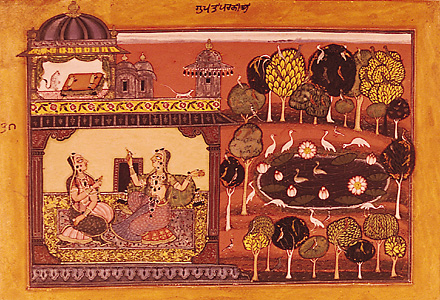Radha is the traditional companion of the Hindu god Krishna , an avatar (physical form) of the god Vishnu . Radha represents the ideal of a worshiper with a passionate love for God . In some traditions, she is an incarnation of the goddess Lakshmi .

Ancient Hindu writings that include Krishna do not mention Radha. She appears later in writings from India’s medieval period (about 500 to 1500). In stories from this period, she is one of many gopis (milkmaids or female cowherds) with whom Krishna loves to play.
The Gitagovinda, a poem written by the Indian poet Jayadeva in the 1100’s, describes Radha as one of many village girls who have fallen in love with the mischievous Krishna. However, Radha clearly is Krishna’s favorite. Late one night, Krishna summons the women of Vrindavan village with his flute and dances with them in a field. Radha then becomes jealous and leaves the group. Much of the poem describes Radha’s longing for Krishna. Hindus consider Radha’s intense and passionate longing for Krishna in such stories as the ideal attitude of a worshiper toward God.
Indian literature does not suggest that Krishna and Radha ever were married to each other. However, Radha popularly is regarded as Krishna’s shakti—that is, his divine feminine energy. In temple images, Radha usually appears with Krishna, and the two are worshiped together.
